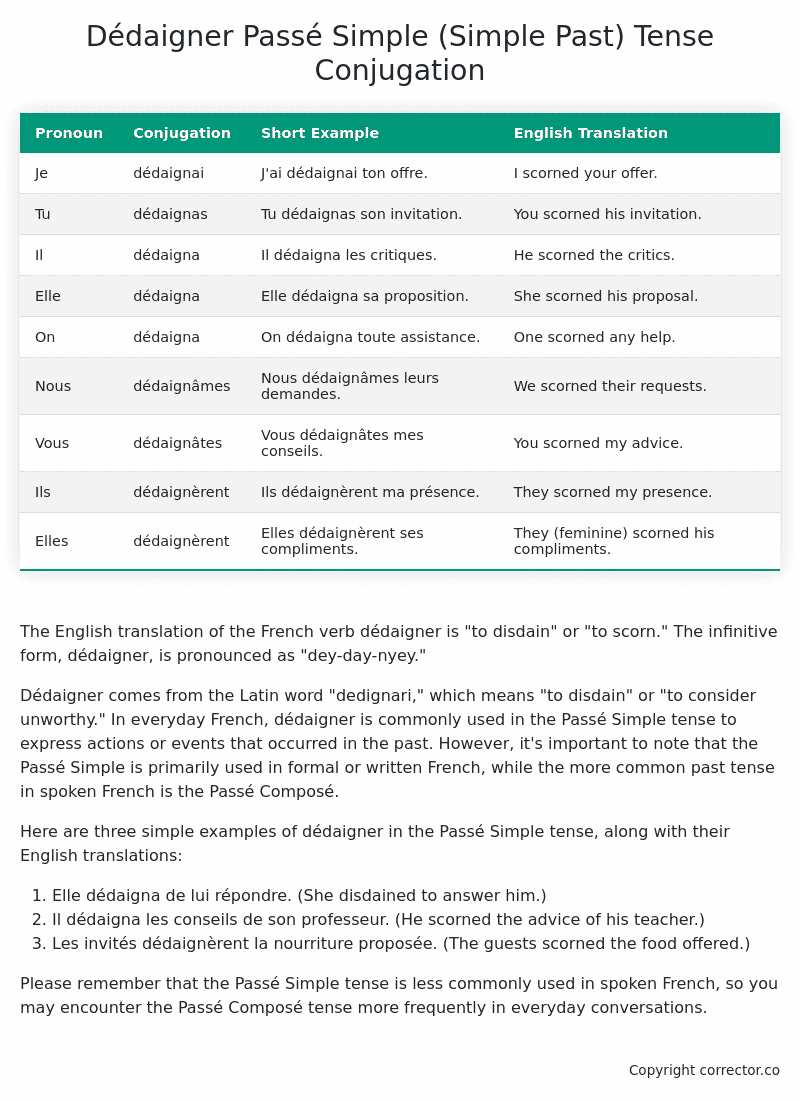Passé Simple (Simple Past) Tense Conjugation of the French Verb dédaigner
Introduction to the verb dédaigner
The English translation of the French verb dédaigner is “to disdain” or “to scorn.” The infinitive form, dédaigner, is pronounced as “dey-day-nyey.”
Dédaigner comes from the Latin word “dedignari,” which means “to disdain” or “to consider unworthy.” In everyday French, dédaigner is commonly used in the Passé Simple tense to express actions or events that occurred in the past. However, it’s important to note that the Passé Simple is primarily used in formal or written French, while the more common past tense in spoken French is the Passé Composé.
Here are three simple examples of dédaigner in the Passé Simple tense, along with their English translations:
- Elle dédaigna de lui répondre. (She disdained to answer him.)
- Il dédaigna les conseils de son professeur. (He scorned the advice of his teacher.)
- Les invités dédaignèrent la nourriture proposée. (The guests scorned the food offered.)
Please remember that the Passé Simple tense is less commonly used in spoken French, so you may encounter the Passé Composé tense more frequently in everyday conversations.
Table of the Passé Simple (Simple Past) Tense Conjugation of dédaigner
| Pronoun | Conjugation | Short Example | English Translation |
|---|---|---|---|
| Je | dédaignai | J’ai dédaignai ton offre. | I scorned your offer. |
| Tu | dédaignas | Tu dédaignas son invitation. | You scorned his invitation. |
| Il | dédaigna | Il dédaigna les critiques. | He scorned the critics. |
| Elle | dédaigna | Elle dédaigna sa proposition. | She scorned his proposal. |
| On | dédaigna | On dédaigna toute assistance. | One scorned any help. |
| Nous | dédaignâmes | Nous dédaignâmes leurs demandes. | We scorned their requests. |
| Vous | dédaignâtes | Vous dédaignâtes mes conseils. | You scorned my advice. |
| Ils | dédaignèrent | Ils dédaignèrent ma présence. | They scorned my presence. |
| Elles | dédaignèrent | Elles dédaignèrent ses compliments. | They (feminine) scorned his compliments. |
Other Conjugations for Dédaigner.
Le Present (Present Tense) Conjugation of the French Verb dédaigner
Imparfait (Imperfect) Tense Conjugation of the French Verb dédaigner
Passé Simple (Simple Past) Tense Conjugation of the French Verb dédaigner (You’re reading it right now!)
Passé Composé (Present Perfect) Tense Conjugation of the French Verb dédaigner
Futur Simple (Simple Future) Tense Conjugation of the French Verb dédaigner
Futur Proche (Near Future) Tense Conjugation of the French Verb dédaigner
Plus-que-parfait (Pluperfect) Tense Conjugation of the French Verb dédaigner
Passé Antérieur (Past Anterior) Tense Conjugation of the French Verb dédaigner
Futur Antérieur (Future Anterior) Tense Conjugation of the French Verb dédaigner
Subjonctif Présent (Subjunctive Present) Tense Conjugation of the French Verb dédaigner
Subjonctif Passé (Subjunctive Past) Tense Conjugation of the French Verb dédaigner
Subjonctif Imparfait (Subjunctive Imperfect) Tense Conjugation of the French Verb dédaigner
Subjonctif Plus-que-parfait (Subjunctive Pluperfect) Tense Conjugation of the French Verb dédaigner
Conditionnel Présent (Conditional Present) Tense Conjugation of the French Verb dédaigner
Conditionnel Passé (Conditional Past) Tense Conjugation of the French Verb dédaigner
Conditionnel Passé II (Conditional Past II) Tense Conjugation of the French Verb dédaigner
L’impératif Présent (Imperative Present) Tense Conjugation of the French Verb dédaigner
L’impératif Passé (Imperative Past) Tense Conjugation of the French Verb dédaigner
L’infinitif Présent (Infinitive Present) Tense Conjugation of the French Verb dédaigner
L’infinitif Passé (Infinitive Past) Tense Conjugation of the French Verb dédaigner
Le Participe Présent (Present Participle) Tense Conjugation of the French Verb dédaigner
Le Participe Passé (Past Participle) Tense Conjugation of the French Verb dédaigner
Struggling with French verbs or the language in general? Why not use our free French Grammar Checker – no registration required!
Get a FREE Download Study Sheet of this Conjugation 🔥
Simply right click the image below, click “save image” and get your free reference for the dédaigner Passé Simple tense conjugation!

Dédaigner – About the French Passé Simple (Simple Past) Tense
Formation
Usage
Narration
Historical Context
Interactions with other tenses
Passé Composé
Imparfait
Conditional and Subjunctive
Summary
I hope you enjoyed this article on the verb dédaigner. Still in a learning mood? Check out another TOTALLY random French verb conjugation!


